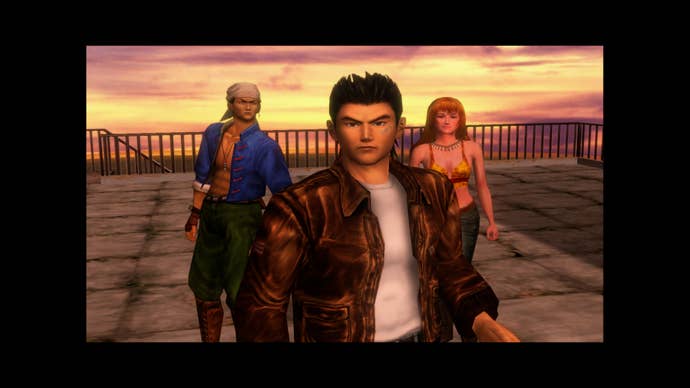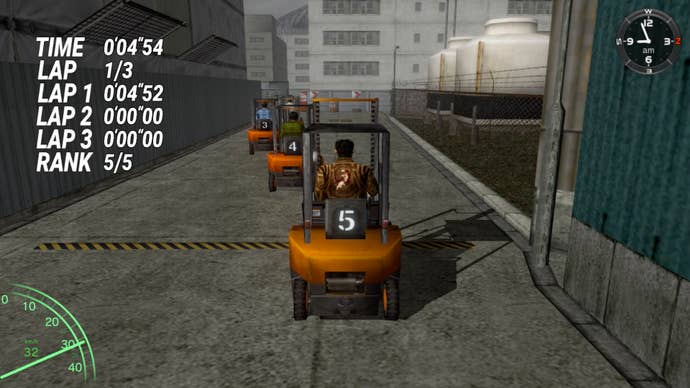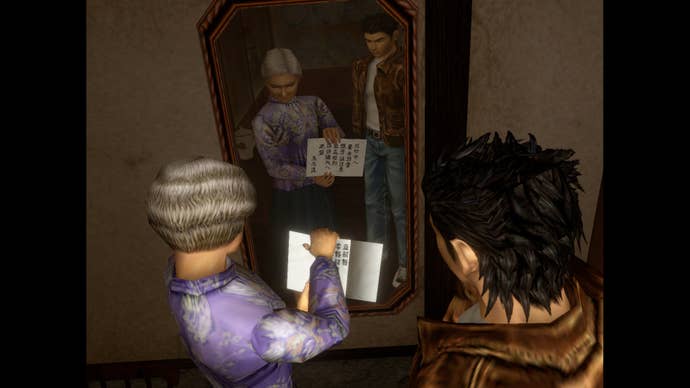The Fans Who Never Let Shenmue Die
The Shenmue community is unlike most, because its many fansites and groups work together.
This article first appeared on USgamer, a partner publication of VG247. Some content, such as this article, has been migrated to VG247 for posterity after USgamer's closure - but it has not been edited or further vetted by the VG247 team.
Everyone has that game that they really love. It could be for nostalgia sake, reminding them of a time before now. It could be for quality's sake, something that's so good that it's hard to top. But the reality is everyone has a different reason.
For Shenmue fans, at least those I've spoken to in the past couple weeks, the reasons for falling in love with the series are almost all parallel. A community organizer notes it's the series' intrinsic feeling of wanting to do good in the world that drew him to it; another points to how its realism makes it easier to escape into. They all mirror the same ideal: Shenmue is refreshingly different from most other video games.

As a Japanese drama, the 1999 released Shenmue is relatively quiet compared to other "epics." It focuses on teenager Ryo Hazuki in the 1980s, following him as he travels from his hometown of Yokosuka, Japan to Hong Kong in its sequel. He's on a quest for revenge after witnessing his father murdered by Lan Di at the start of the first game, chasing him literally across the sea. Shenmue has a reputation for being calm, with in-game time passing by slowly and a realistic town to explore, harboring intricate detail at every corner and capsule machine. Long before the likes of Yakuza, Shenmue gamified the smaller parts of everyday life. For its time, it was groundbreaking. Naysayers today may say it's too mundane, but the diehards that make up its persistent fanbase say otherwise.
"I think [the Shenmue community is] smaller than most, but the amount of passion that's there is unlike anything I've seen before with any other," says documentarian Adam Sipione. Sipione recently launched a Kickstarter to crowdfund a full-fledged documentary about the Shenmue series and the fans around it called A Gamer's Journey: The Definitive History of Shenmue. The campaign was funded within its first few days. "I have friends who are huge Call of Duty, Halo, or Overwatch fans, but nothing compares to that level of dedication that Shenmue fans have."
Across online communities, it's easy to imagine them like little islands isolated from other clusters. Like cliques from high school, or friend groups that go to bar trivia nights in coastal cities. In my day, before social media got big, fandoms were divided by Gaia Online guilds, tight knit Livejournal communities, and miscellaneous forums. It was rare to find friends in shared places. But the Shenmue fan community is different: Brought together by social media, with fan sites working together as a result.
At a glance, the Shenmue fandom is daunting. On any number of fan sites or social media groups, you'll also find a laundry list of links to other sites. Arguably the biggest is Shenmue Dojo, a long-running news site and more dominantly a forum, which recently got a big makeover and a new webmaster, passed down from its former head George Malta. There are spots like Shenmue Bar, Shenmue Master, and more for Chinese, French, and other non-English speaking audiences. There's also Shenmue 500k, the largest Facebook community, where even voice actors from the series loiter about. On Team Yu's Facebook page, a banner is strewn at the top with pullquotes of media outlets dissing the Shenmue community. They wear the accusations of the community's petitions for Shenmue 3 and more leading to "nothing" like a badge of honor. And that's just the tip of the dozen-plus sites lingering across the world wide web.
There was a time where many of these circles stayed separated, especially as sites have dissolved over the decade-plus and begun anew. But over the years something changed, and the Shenmue community built bridges between its islands. The leaders among it (though they are hesitant to call themselves as such) are friends with one another too, sometimes even meeting up in person. In conversation, they breezily namedrop one another. They don't just know each other as acquaintances spread across multiple sites in the community—they're mostly all good friends too.
Sipione's documentary on Shenmue started back in 2014 before Shenmue 3 was even announced. Back then, it was just a teaser trailer with a few interviews in the can. The project was an attempt to show the world that people still care about the franchise. And then Shenmue 3 was actually announced in 2015 at E3, changing everything. Sipione was more of a lurker than an active community member in his early days as a fan, but over time found himself embedded more and more in the community. His Facebook friends grew to add around 50 people from the community whom he talks to regularly. As Sipione explains, it's the type of community where "everybody knows everybody." No one is really more than a single degree of separation away. His work on the documentary got rolling at a more intense capacity, even roping Shenmue director Yu Suzuki and other key creators and figures in the industry into the mix.
"It's a community that's been around for, geez [since] like 1999, 2000 I guess," says Sipione. "But in that 15 year gap [sic] what was accomplished just between the collective efforts of all the fan community was something that inspired me to go and make this film, because it's like, you don't see that with anything else. I mean, I could just be kind of jaded even saying that, but I think it's true."
Over the years, there had been many fan campaigns to encourage development on Shenmue 3. One was started by fan Aaron Barstow, who would go on to found the Facebook group Shenmue 500k in response to other Shenmue Facebook groups such as "Shenmue 3, one day it will come” being overrun by trolls. Barstow led the site Shenmue Stare, a cheeky blog where he requested Shenmue 3 via joke posts (usually of images), haikus, and even self-produced videos. After three years, three months, and three days, he folded the daily postings at Shenmue Stare and devoted his full time and energy into managing Shenmue 500k, which as of now has 22,000 members—and it's active too.
"I wanted [Shenmue 500k] to be a place for everyone around the world to talk shop in an easily accessible fashion. The fans, voice actors, game designers; everybody has Facebook. This made it easy for us to campaign in conjunction with the other fan sites like the Dojo and Shenmue Master," writes Barstow over email. "There was some animosity amongst some of us in the beginning, but in time it became the easiest means for us all to communicate and that animosity just melted away. Over the next few years we got a lot of great 500k admins that made the group what it is today. Without them we’d be lost really."
That's the key to many of Shenmue's fansites and groups, even during the "dark days" (a phrase that came up through multiple different conversations) of seemingly no Shenmue 3 in sight—there was always that light at the end of the tunnel. Whether it was hoping for Shenmue 3, Shenmue remastered, or just maintaining the friendships made along the way. For the most part, in recent years fans maintained hope.

"They say that Shenmue fans are crazy, and that’s a little bit true, but the nature of the series is about self-discovery," writes Barstow. "So the fans reflect that a bit by being, for want of a better term, intensely chill? More self-reflective and mellow, yet also more driven than the average person." Barstow notes that there was even a point in time where Shenmue 500k was in talks to consolidate with Team Yu, a fan initiative that had a lot in common with Barstow's Shenmue Stare and ran alongside the blog for a bit. Barstow and Team Yu's organizer James Hamill opted to keep the two communities separate to make "the community appear larger," though unintentionally landing as another example of the Shenmue community's interconnectedness. Working together and working together while apart has become synonymous for the greater good of Shenmue.
Hamill, in particular, joined the community relatively late while observing as a fan from afar. He started Team Yu in 2012, hosting "tweetathons," hoping to capture the attention of not necessarily just the diehard fans across the many Shenmue fansites in the wild, but the casual fans too. "I spent nine years running a very small but close-knit forum for pro wrestling fans. In that time at least, it was rare to see any collaboration between sites of that ilk because, ultimately, they all had the same structure and the same purpose, and were therefore competing for the same users. For that reason, there was an inherent reluctance to promote one another," Hamill tells me over email. Meanwhile in the Shenmue fandom, there's a site for everyone. No matter what language you speak; whether you prefer Facebook or traditional forums, there's likely something out there for you. "It's an approach that has obviously worked wonders for us in recent years, but for many kinds of fan [communities] on the web it's either not viable or simply not a necessity."
Shenmue 3 often felt like one of those impossible games that would never happen. A dream game lost to time like Final Fantasy Versus XIII, The Last Guardian, Beyond Good & Evil 2, Kingdom Hearts 3—all of which have been resuscitated in some way in the past five or so years. The world maybe shouldn't have given up on Shenmue 3 so easily. After all, Shenmue 2 ends on a cliffhanger: Ryo still has a father to avenge and more kittens to save. Tom Johnson has more hot dogs to sell. (Probably.)
The previous pleas for Shenmue 3, before Team Yu rallied up fans, seemed widely ignored. Hamill recalls a successful petition that acquired 65,000 signatures and went unnoticed. He also remembers other efforts, like the Myspace group that organized "mass mailing of toy capsules containing pleas from fans to SEGA HQ." Nothing seemed to come of that either. Hamill didn't give up though, and neither did the army of fans behind him.
Then, the tweetathon carried off in full force. On the third day of every month, fans would tweet using the #Shenmue hashtag, alongside other more specific hashtags. Some would tweet directly to Sony and Sega executives. The requests were largely polite, but the magnitude could be felt on a monthly basis. Hamill distances Team Yu from being solely responsible for the Shenmue revival in the form of Shenmue 3 and the Shenmue remasters, pointing towards the breadth of communities before him. In a blog post cataloging the Shenmue community's almost two-decade long history, he credits Team Yu's success as "standing on the shoulders of giants." Over email, he even followed up to assure that his role was in no ways singular, writing, "The last impression I want to give is that I did everything by myself or that I've forgotten the contributions of others."

Ireland-based Peter Campbell, the current webmaster of Shenmue Dojo, doesn't downplay Team Yu's role though. He credits Team Yu and Hamill personally as being instrumental in showing the Shenmue community that they can work together, and don't have to be as isolated as most fan communities typically are. The tweetathons that began in 2012 were arguably the beginning of the greater Shenmue communities becoming more interconnected than they had been before, beyond just the sister sites such as Shenmue Dojo and Shenmue Master (which I'm told is "essentially a French Shenmue Dojo").
"There weret times back in our history when people, I will not say myself, but I was standing on my own," Campbell says. "A lot of people didn't believe anymore. And it took people like those guys, [Aaron Barstow and James Hamill,] to believe and then encourage us to come along with them for the ride." The ride apparently led to here. Not only is Shenmue 1 and 2 remastered out for modern platforms out this week, Shenmue 3 is still in active development too—and its delays haven't dissuaded the believers. They've waited since basically 2001 after all (or a couple years later, depending on if they imported the sequel before its western releases or not). What will another year or so hurt?
The community is optimistic for the future too. In standing together, they arguably showed Sega and the other IP-bearing powers that be that people do, in fact, care about a Japanese drama from 1999 with an impeccable attention to detail. We've seen the power of community show up in other recent happenings too, like the Gravity Rush community strongly campaigning on Twitter to pressure Sony not to shutter its servers a mere year after its launch. It worked, even if only for a short seven months.
Online fandoms can be a powerful force, especially when they work together. As for why the webmasters, forum mods, social media wranglers, documentarians, and more have remained so passionate about Ryo Hazuki's journey for nearly two decades, that answer is a bit harder to parse. Some have personal reasons, like relating to the story of mourning a father who died too soon. Others note it's the friends in the far-reaching community that have kept them here. Barstow tells me it's the detail in both games, inspiring him to "be fascinated with every square inch of the universe." Shenmue undeniably impacted their lives though. And even with Shenmue 3 on the horizon and Shenmue 1 and 2 remastered already here, some still tweet on the third of every month just to remind the world of how much Shenmue means to them. Shenmue fans may have a reputation for being "crazy," but at least there's something worthwhile to be crazy about.


